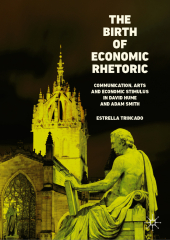 Neuerscheinungen 2019Stand: 2020-02-01 |
Schnellsuche
ISBN/Stichwort/Autor
|
Herderstraße 10
10625 Berlin
Tel.: 030 315 714 16
Fax 030 315 714 14
info@buchspektrum.de |

Estrella Trincado
The Birth of Economic Rhetoric
Communication, Arts and Economic Stimulus in David Hume and Adam Smith
1st ed. 2019. 2019. v, 218 S. 1 SW-Abb. 210 mm
Verlag/Jahr: SPRINGER, BERLIN; SPRINGER INTERNATIONAL PUBLISHING 2019
ISBN: 3-03-014305-8 (3030143058)
Neue ISBN: 978-3-03-014305-3 (9783030143053)
Preis und Lieferzeit: Bitte klicken
This book explores and compares the works of two great economists and philosophers, David Hume and Adam Smith, considering their contributions to language, perception, sympathy, reason, art and theatre to find a general theory of rationality and economics. The author considers and analyses both figures through a range of approaches, and moves on to demonstrate how different concepts of language affect Hume´s and Smith´s idea of value and economic growth. This book contributes to a wider literature on communication and language to demonstrate that economics is linked to rhetoric and is an essential part of human nature.
1. The Setting of the Play 1.1. Introduction 1.2. The Scottish Enlightenment 1.3. The Birth of Rhetoric 1.4. Concepts of time 2. Hume and Smith: Truth and Experience 2.1. Friendship is in similarities 2.2. But allure is in differences 2.3. A literary strategy 2.4. Adam Smith´s piety 3. David Hume 3.1. The life of David Hume 3.2. Scepticism 3.2.1. Epistemological scepticism 3.2.2. Moral naturalism 3.3. Conservatism 3.4. Doctrine of utility 3.4.1. Morality 3.4.2. Utility 3.4.3. Sympathy 3.4.4. Suicide 3.4.5. Justice 4. Adam Smith 4.1. Smith´s realism 4.2. Perception and pleasure 4.3. The Self 4.3.1. The reactive self 4.3.2. The active self 4.4. Rationality 4.5. Sympathy 5. Rhetoric in Hume and Smith 5.1. The first formation of language 5.2. Rhetoric and the theories of language 5.3. The literary critique 5.4. The invention of imitation 5.5. Theatre 6. Consequences for Economic Theory 6.1. Time and economics 6.2. Language and economics 6.3. Economic growth 6.4. Money issues 7. Conclusion
Estrella Trincado is Professor of Economic History and History of Economic Thought at the Complutense University of Madrid, Spain. Her research interests specialise in the history of economic thought in general and in classical economics in particular. In 2011 she won the Young Scholar of the Year award presented at the European Society for the History of Economic Thought(ESHET). Estrella is an author of books and has contributed to book chapters and a number of papers published in international journals.


